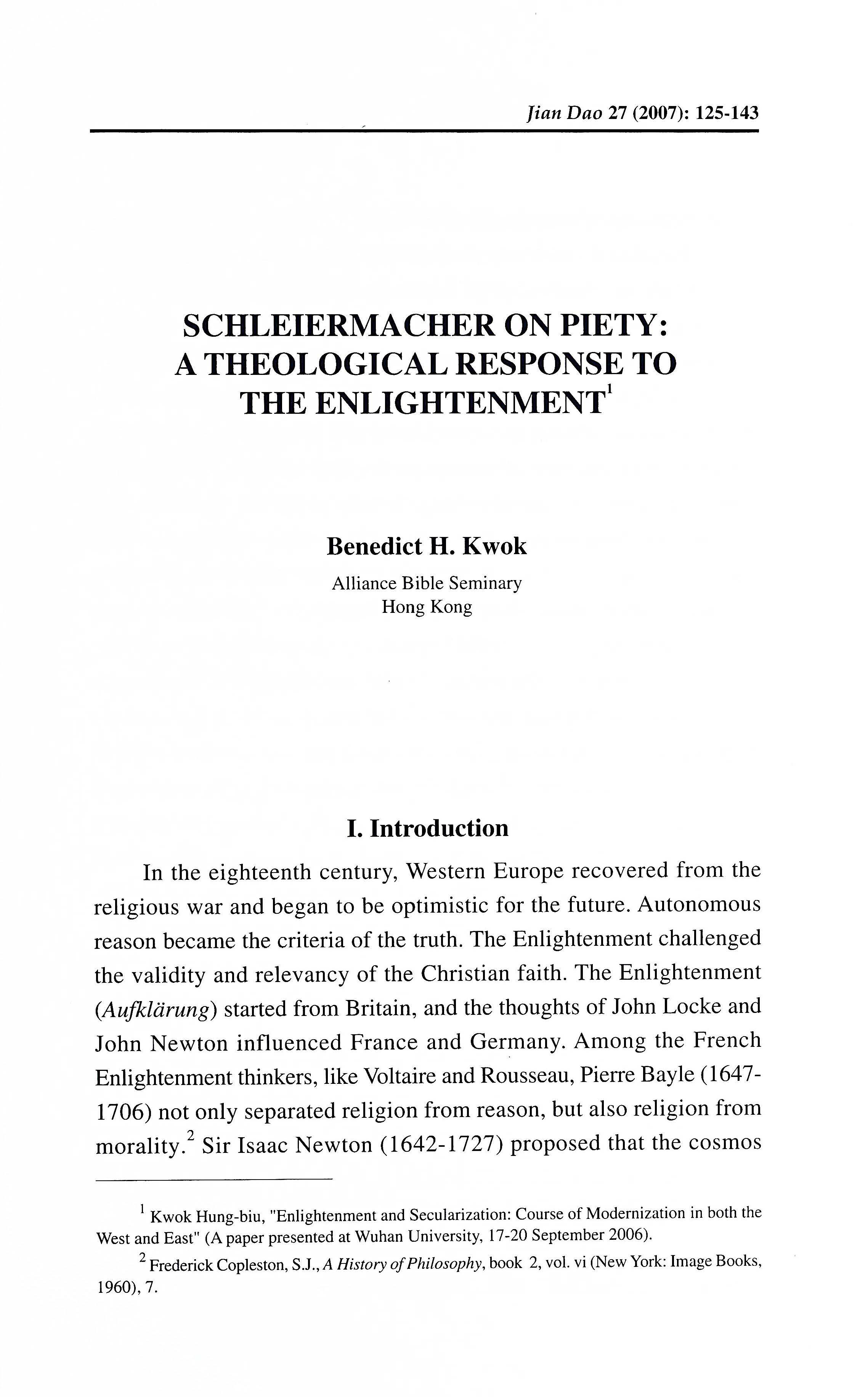Schleiermacher On Piety: A Theological Response To The Enlightenment(施萊爾馬赫論敬虔──對啟蒙運動的神學回應) /郭鴻標
撮要
十八世紀西歐經歷宗教戰爭後對將來持樂觀態度,啟蒙運動的影響由英國擴展至法國和德國。德國啟蒙運動的焦點是歷史研究,萊辛質疑偶發及個別歷史事件如何引申永恒意義。康得將知識定為經驗客體的範圍內,而不是事物。理性主義帶來經驗主義及對形上學的抗拒,理性成為判別真理的標準,影響啟蒙運動的理性主義挑戰基督教信仰的真實及適切。在德國,敬虔運動及浪漫主義成為回應理性主義的思潮。菲希特則證釋上帝為道德責任的最高理型,黑格爾則循人的心靈尋找終極真理。施萊爾馬赫則別樹一幟,拒絕將宗教定為理性系統或者道德律令,而從人的感受描繪絕對依賴神的情懷。本篇文章主要交待施萊爾馬赫對敬虔的觀點,並從華人神學的觀點回應。本篇論文分為六個部分:第一部分是導言, 第二部分是施萊爾馬赫的神學建構,第三部分是施萊爾馬赫論敬虔,第四部分是施萊爾馬赫論倫理,第五部分是施萊爾馬赫論敬虔與倫理的關係,第六部分是施萊爾馬赫神學對漢語神學的啟迪。首先,基督教研究不能沒有信仰。第二 ,從人 類、學進路尋找超越的上帝必須建基於超越上帝的實體。第三,感受、理性及道德是相互關連的。第四,施萊爾馬赫的敬虔與倫理神學是一條回應啟蒙運動的道 路。最後,施萊爾馬赫同時是文化神學家及教會神學家。
ABSTRACT
In the eighteenth century, Western Europe was recovered from the religious war and began optimistic for the future. The Enlightenment Rationalism started from Britain and influenced France and Germany. In Germany, the focus of the Enlightenment was the historical study. G.E. Lessing doubted how eternal truth could derive from particular accidental historical event. Immanuel Kant defined knowledge within the limits of the experience of the object, but not the object itself. Reason became the criteria of truth and has challenged the validity and relevancy of the Christian faith. In Germany, Pietism and Romanticism became a response to the Enlightenment. J.G. Fichte interpreted God as the supreme model of moral duty, and G.W.F. Hegel attempted to grasp the ultimate truth by means of the human spirit. Friedrich Schleiermacher went his own way and avoided interpreting religion as a rational system nor a set of moral rules, but as a kind of consciousness of an absolute dependence on God. This article deals with Schleiermacher’s idea on piety and gives response from the sino-theological perspective. This article is divided into six parts: the first part is an introduction. The second part is the theological construction of Schleiermacher. The third part is Schleiermacher on piety. The fourth part is Schleiermacher on ethics. The fifth part is the relationship between Schleiermacher’s piety and ethics. The sixth part is the implications of Schleiermacher for Sino-Theology. Firstly, the Christian studies should have personal faith. Secondly, the anthropological search for God should be built on the reality of the transcendent God. Thirdly, feeling, reason and ethics are interrelated. Fourthly, Schleiermacher’s theology of piety and ethics was a response to the Enlightenment. Fifthly, Schleiermacher is both a cultural and church theologian.
原載於《建道學刊》27期(2007年1月),頁125-143。
作者簡介
郭鴻標
神學系教授
副院長 (行政)
Latest Articles
新手牧者研究計劃(三):新手牧者的身心靈狀態 / 盧慧儀
2025 年 11 月 19 日
個體與關係:滕近輝思想中「深化」的靈性觀 / 倪步曉
2025 年 11 月 18 日
香港九龍塘基督教中華宣道會之起源和發展史/陳智衡
2025 年 10 月 20 日
Highlights
[電子書]困境與抉擇:「建道研究中心30週年誌慶」跨學科研討會論文集/廖炳堂、倪步曉主編
2025 年 1 月 2 日
從梧州到長洲:建道神學院125年的挑戰與恩典 / 陳智衡
2023 年 10 月 1 日
微小教會的見證/高銘謙
2023 年 6 月 1 日








